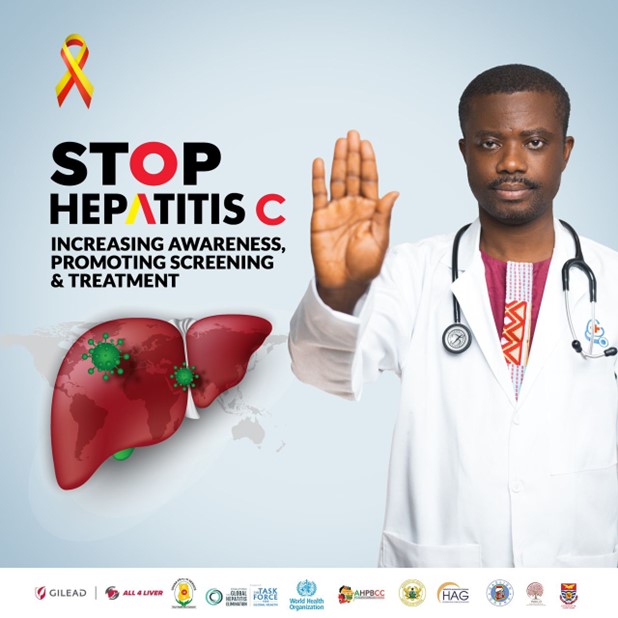By Sandra Agyeiwaa OTOO
Healthcare experts in Ghana are intensifying calls for extensive care to eliminate Hepatitis C along with its devastating health and economic implications as Ghana battles with its increased burden.
A report from the World Health Organization (WHO) estimates that 442,000 people are living with Hepatitis C and that 10,700 new people are infected across Ghana each year.
However, limited awareness, inadequate testing, and costly treatment options have hindered efforts to combat the disease.
Speaking on long-term awareness and treatment, Dr Amoako Duah, Consultant Gastroenterologist, University of Ghana Medical Center stressed the need to prioritize education, screening for Hepatitis C, and accessible treatment to prevent further spread and reduce fatal complications such as liver cancer.
“Public awareness campaigns such as the one we have embarked on and screening people at risk, especially Ghanaians living in the five regions in northern Ghana that are most seriously affected by Hepatitis C, are very important.
Additionally, training of healthcare workers to increase knowledge and capacity on Hepatitis C prevention, testing and treatment can help eliminate Hepatitis C,” he mentioned.
According to him, there should be increased availability of Hepatitis C diagnostics across the country – in particular viral load testing to confirm the presence of Hepatitis C in the blood. This testing, he said, should be subsidised or offered on the National Health Insurance Scheme (NHIS) for patients to increase the ability to diagnose patients and link them to care.
Prof Charles Ampong Adjei, Associate Professor of Public Health Nursing, University of Ghana, pointed out that “patients must pay out of pocket for Hepatitis C tests, which can be a barrier to care.
Specifically, the confirmatory test for Hepatitis C, known as the viral load (HCV RNA) can range from GH¢700 -1100 and this is very expensive for many patients. What this means is that people cannot be treated because they cannot do this test, and this puts them at risk of going untreated and developing liver failure and liver cancer.”
Speaking on the ‘STOP Hep C Ghana Project’, a free Hepatitis C treatment project for Ghanaians which was launched in March 2023, by the government of Ghana, with support from the government of Egypt and other partners, Prof Adjei said patients were paying between GH¢5000 -10,000 for a 3-month course of treatment.
“Now, thankfully, treatment for Hepatitis C is free in all regional and teaching hospitals in Ghana” he said.
Asked about how their current public awareness campaign can address stigma and misconceptions about Hepatitis C, he highlighted that “the campaign is dispelling myths and rumors about Hepatitis C by providing information about modes of transmission and that Hepatitis C can be cured.
For example, we are emphasizing that Hepatitis C cannot be spread through kissing, hugging or eating with someone who has the disease, but rather through infected blood – sharing personal care items like razors, tribal scarification, tattooing, injecting drug use and occasionally through sex.”
“Many people know about Hepatitis B but have never heard of Hepatitis C, so raising awareness and encouraging people to get tested is very important. Secondly, providing information about how the test is done and where people can get tested – such as regional and teaching hospitals, is another strategy to encourage testing,” Dr Duah revealed.
“For the country as a whole, Hepatitis C and its complications of liver failure and liver cancer can reduce the workforce and reduce economic productivity and growth of the country because people who could potentially contribute are not able to do so,” said Dr. Duah.
Other healthcare experts assisting with this campaign include Dr. Peter Fosu, Public Health Physician Specialist, Trust Hospital, Dr Adwoa Agyei-Nkansah, Consultant Gastroenterologist at the Korle Bu Teaching Hospital, Dr Yvonne Ayerki Nartey, Physician Specialist, Cape Coast Teaching hospital and Ms. Afia Drah, Health Communications Consultant, Forecast Strategies.
Implementing partners including the University of Cape Coast, National Viral Hepatitis Control Programme of the Ghana Health Service, Ghana Association for the Study of Liver and Digestive Diseases (GASLIDD), Hepatitis Alliance of Ghana, World Health Organisation Country Office, Coalition for Global Hepatitis Elimination, Africa Institute for Liver and Digestive Disease Foundation and the Government of Egypt have all joined forces to support Ghana’s Hepatitis C elimination efforts.
The awareness campaign is sponsored by Gilead Sciences’ All4Liver Grant.










